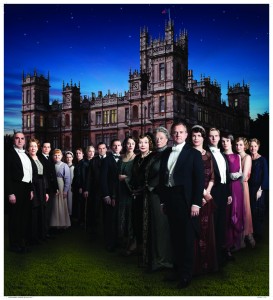So, cult-favorite Downton Abbey is back for its third season, and once again American audiences can sit back and watch in gross fascination as the drama unfolds in 1921 England.
Seasons one and two brought a myriad of tragedy as the Crawley family lost an heir with the sinking of the Titanic, found an heir through a distant male cousin, struggled through a family scandal concerning the honor of eldest daughter Mary, lost another natural heir through an unfortunate miscarriage for Cora, not to mention the trauma of World War I, and the emotional turmoil of the love-triangle between Mary, Matthew, and Lavinia.
The first two seasons were fairly believable and quite enjoyable with the exception of the unlikely resurrection of a soldier who claimed to be Patrick, the lost heir from the Titanic sinking in the first episode of the first season. But, three episodes into this season I am already growing restless and lacking a certain sense of fulfillment.
The constant bickering between Matthew and Mary is tiresome due to Mary’s insensitivity and tunnel-vision towards saving her ancestral home. The on-going saga of Bates in prison never seems to developing past glimpses of his life behind bars. The writers could at least devote more time to giving the audience just a bit of resolution, or at least answers. Then, there is the overarching “Downton has no money” issue. But I won’t get into that, for fear of spoiling even more of the season than I already have.

Ultimately, the success of this season and subsequent seasons will depend on how well Julian Fellowes, creator, and his team of writers planned the storyline even before the pilot episode launched. My fear, based on season three’s dismal first three episodes, is that we will all continue to watch our beloved show out of loyalty and not necessarily due to a compelling storyline.
But, what happens if we do just keep watching out of loyalty and not because it’s really good anymore? Why will we keep watching? Why is it such a popular show? I’ll be honest, when I first heard the premise I couldn’t understand why everyone was watching PBS on a Sunday night. It was not until I was desperate to procrastinate writing the first part of my senior seminar project that I really became interested in the show. Four episodes and four hours later, I was addicted.
Downton Abbey has such a cult-following because we want to be transported to a different time and place. Yes, I understand this is why we read books and watch films—escapism at its finest—but watching Downton is about the experience. Everything from the costumes to the rich inclusion of history makes this an accessible show for just about everyone. We are fascinated by people who are not like us, which is exactly what the characters of Downton Abbey are. They are privileged and have servants and live in a time we cannot conceive of. We can’t relate to the upstairs, the elite, and we can’t relate to the downstairs, the servants, so we just sit back and watch in fascination.
It’s not just the accents or the costumes; it’s more about our fascination with the polished, elevated upper class. America just doesn’t have this. Yes, we have our trashy celebrities, but we lack our refined Will and Kate. In Matthew and Mary, we see the same thing, but in 1921. Two wildly attractive, seemingly committed people trying to figure out how love and relationships work. Rocky and painful, we want them to work and succeed, so we tune in week after week, just like we peruse the tabloids religiously while in line at the Jube (excuse me, Shop n’ Save) whenever we see Kate’s pretty face or Will’s big grin.
So, while I hope the third season of Downton Abbey proves to be as entertaining and enjoyable as the first two, I have low expectations. If I am not proven wrong, I will keep watching for the sole purpose of viewing Lady Mary’s excellent outfits and seeing Matthew and Mary cobble together a first year of marriage.
